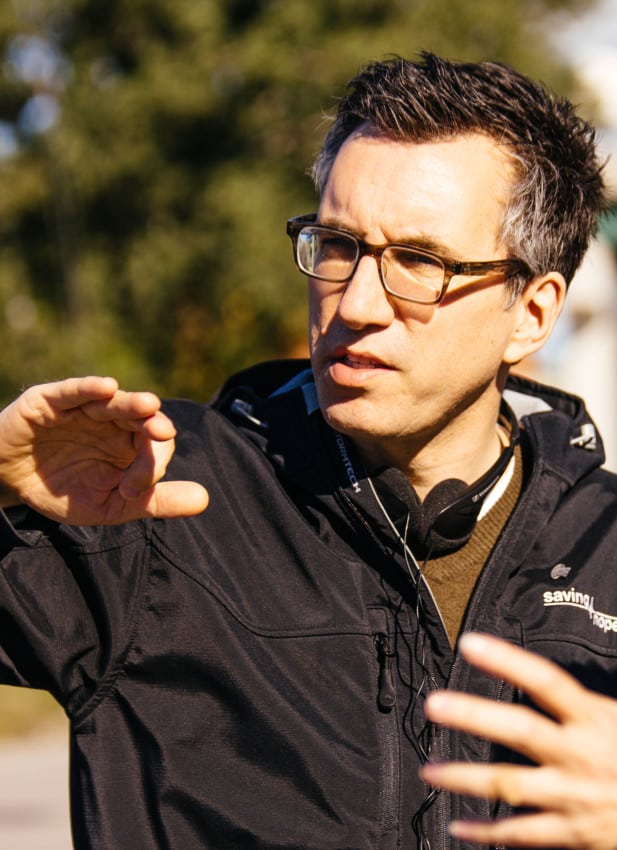BRIDGET MORRISON
Greg Nelson, a 1998 graduate of the University of Saskatchewan, has found success as a writer for theatre, radio and television. Nelson has plenty to share about his experience in the industry and what it’s really like to pursue a career in writing.
Nelson began his career while working on a double honours undergraduate degree in English and drama, writing plays that were performed as student productions. After graduation, Nelson undertook a master’s degree in playwriting at the University of Alberta, where he continued to write for student productions as well as the Edmonton Fringe Festival.
Nelson found his first professional success writing for CBC Radio. His comedic radio play The Great Bakery Revolution followed two independent bakers fighting back against corporate cheesecake makers. Nelson also co-created the critically acclaimed CBC Radio series Afghanada — one of the projects he is most proud of — which aired 100 episodes over six years. After more than a decade writing for stage and radio, Nelson made the switch to television.
Now, Nelson’s resume includes writing credits on many notable Canadian television series such as Rookie Blue, The Border, Remedy, Saving Hope and The Republic of Doyle. Nelson also created his own television show, Played, a police drama that follows the elite Covert Investigations Unit in Toronto, which goes undercover to infiltrate criminal organizations. Played was picked up by  CTV in 2013 and aired for one season.
CTV in 2013 and aired for one season.
Nelson has plenty of experience at all levels of writing and production in television.
“Basically, you work your way up. As you gain more experience, your title changes and you are given more and more responsibility,” Nelson said.
Within the structure of one television show’s team, reliable writers take small, steady steps up the ranks. It is not unusual to switch roles over the lifetime of a show, going from associate story editor to co-producer.
Nelson loves the atmosphere inside the writing room, as it is a place where a group of writers build trust and work from collaborative ideas — though it isn’t always a smooth process.
“It’s a lot of talk — a lot of brainstorming. Sometimes a story room can be tense and competitive — people arguing a lot, and feeling undervalued. But most of the time it is exhilarating and fun,” Nelson said.
Nelson’s love of the writing process has been the driving force behind his extensive body of work. The Canadian media industry has taken notice, honoring Nelson with numerous nominations and awards throughout his career.
Most recently, in 2013, Nelson was nominated for a Canadian Screen Award for Best Writing in a Dramatic Series for his episode “A Good Shoot” from the TV series Rookie Blue. Afghanada won the Canadian Screenwriting Award for Radio Drama in both 2007 and 2008.
Internationally, Nelson was awarded both a gold medal for Best Radio Drama and a silver medal for Best Writing at the 2008 International Radio Festival in New York City, for the Remembrance Day special episode of Afghanada. Nelson is particularly proud of Spirit Wrestler, a play published in 1998 that was critically acclaimed by the Saskatchewan Writers’ Guild.
Nelson has had many successes throughout his career and has a grounded perspective on the entertainment writing industry.
“There is a lot of rejection in this business, at every stage of the process and at every level of experience,” Nelson said.
According to Nelson, it takes a long time and plenty of dedication to the craft to become a good television writer.
“You have to understand how stories work. Learn about protagonists, objectives, obstacles, crises and climaxes,” Nelson said.
A well-crafted story is different for radio, stage or television, so it’s important to master the techniques specific to each. For current U of S students wanting to pursue writing, Nelson emphasizes the importance of creating empathy so that an audience can connect to your characters. Equally important, though, is a good attitude.
“There is nothing more terrifying and humbling than the blank page. Be confident, be adventurous, keep your sense of humor. And don’t give up.”
—
Supplied / Jan Thijs
Leave a Reply